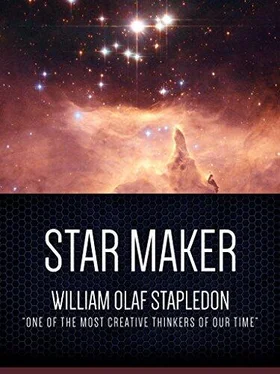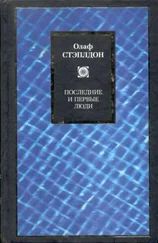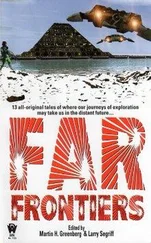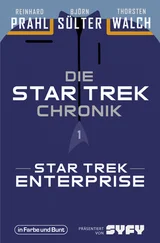Presently the younger nebulae observed that their seniors, one by one, were falling into a state of sluggishness and confusion which ended invariably in the sleep that men call death. Soon it became evident even to the most buoyant spirit that this disease was no casual accident but a fate inherent in the nebular nature.
One by one the celestial megatheria were annihilated, giving place to stars.
Looking back on these events from my post in the far future, I, the rudimentary cosmical mind, tried to make known to the dying nebulae in the remote past that their death, far from being the end, was but an early stage in the life of the cosmos. It was my hope that I might give them consolation by imparting some idea of the vast and intricate future, and of my own final awakening. But it proved impossible to communicate with them. Though within the sphere of their ordinary experience they were capable of a sort of intellection, beyond that sphere they were almost imbecile. As well might a man seek to comfort the disintegrating germ-cell from which he himself sprang by telling it about his own successful career in human society.
Since this attempt to comfort was vain, I put aside compassion, and was content merely to follow to its conclusion the collapse of the nebular community. Judged by human standards the agony was immensely prolonged. It began with the disintegration of the eldest nebulae into stars, and it lasted (or will last) long after the destruction of the final human race on Neptune. Indeed, the last of the nebulae did not sink into complete unconsciousness till many of the corpses of its neighbors had already been transformed into symbiotic societies of stars and minded worlds. But to the slow-living nebulae themselves the plague seemed a galloping disease. One after the other, each great religous beast found itself at grips with the subtle enemy, and fought a gallant losing fight until stupor overwhelmed it. None ever knew that its crumbling flesh teemed with the young and swifter lives of stars, or that it was already sprinkled here and there with the incomparably smaller, incomparably swifter, and incomparably richer lives of creatures such as men, whose crowded ages of history were all compressed within the last few distressful moments of the primeval monsters.
2. THE SUPREME MOMENT NEARS
The discovery of nebular life deeply moved the incipient cosmical mind that I had become. Patiently I studied those almost formless megatheria, absorbing into my own composite being the fervor of their simple but deep-running nature. For these simple creatures sought their goal with a single-mindedness and passion eclipsing all the worlds and stars. With such earnest imagination did I enter into their history that I myself, the cosmical mind, was in a manner remade by contemplation of these beings. Considering from the nebular point of view the vast complexity and subtlety of the living worlds, I began to wonder whether the endless divagations of the worlds were really due so much to richness of being as to weakness of spiritual perception, so much to the immensely varied potentiality of their nature as to sheer lack of any intense controlling experience. A compass needle that is but feebly magnetized swings again and again to west and east, and takes long to discover its proper direction. One that is more sensitive will settle immediately toward the north. Had the sheer complexity of every world, with its host of minute yet complex members, merely confused its sense of the proper direction of all spirit? Had the simplicity and spiritual vigor of the earliest, hugest beings achieved something of highest value that the complexity and subtlety of the worlds could never achieve?
But no! Excellent as the nebular mentality was, in its own strange way, the stellar and the planetary mentalities had also their special virtues. And of all three the planetary must be most prized, since it could best comprehend all three.
I now allowed myself to believe that I, since I did at last include in my own being an intimate awareness not only of many galaxies but also of the first phase of cosmical life, might now with some justice regard myself as the incipient mind of the cosmos as a whole.
But the awakened galaxies that supported me were still only a small minority of the total population of galaxies. By telepathic influence I continued to help on those many galaxies that were upon the threshold of mental maturity. If I could include within the cosmical community of awakened galaxies some hundreds instead of a mere score of members, perhaps I myself, the communal mind, might be so strengthened as to rise from my present state of arrested mental infancy to something more like maturity. It was clear to me that even now, in my embryonic state, I was ripening for some new elucidation; and that with good fortune I might yet find myself in the presence of that which, in the human language of this book, has been called the Star Maker.
At this time my longing for that presence had become an overmastering passion. It seemed to me that the veil which still hid the source and goal of all nebulae and stars and worlds was already dissolving. That which had kindled so many myriad beings to worship, yet had clearly revealed itself to none, that toward which all beings had blindly striven, representing it to themselves by the images of a myriad divinities, was now, I felt, on the point of revelation to me, the marred but still growing spirit of the cosmos.
I who had myself been worshipped by hosts of my little members, I whose achievement reached far beyond their dreams, was now oppressed, overwhelmed, by the sense of my own littleness and imperfection. For the veiled presence of the Star Maker already overmastered me with dreadful power. The further I ascended along the path of the spirit, the loftier appeared the heights that lay before me. For what I had once thought to be the summit fully revealed was now seen to be a mere foot-hill. Beyond lay the real ascent, steep, cragged, glacial, rising into the dark mist. Never, never should I climb that precipice. And yet I must go forward. Dread was overcome by irresistible craving.
Meanwhile under my influence the immature galaxies one by one attained that pitch of lucidity which enabled them to join the cosmical community and enrich me with their special experience. But physically the enfeeblement of the cosmos continued. By the time that half the total population of galaxies had reached maturity it became clear that few more would succeed.
Of living stars, very few were left in any galaxy. Of the host of dead stars, some, subjected to atomic disintegration, were being used as artificial suns, and were surrounded by many thousands of artificial planets. But the great majority of the stars were now encrusted, and themselves peopled. After a while it became necessary to evacuate all planets, since the artificial suns were too extravagant of energy. The planet-dwelling races therefore one by one destroyed themselves, bequeathing the material of their worlds and all their wisdom to the inhabitants of the extinguished stars. Henceforth the cosmos, once a swarm of blazing galaxies, each a swarm of stars, was composed wholly of star-corpses. These dark grains drifted through the dark void, like an infinitely tenuous smoke rising from an extinguished fire. Upon these motes, these gigantic worlds, the ultimate populations had created here and there with their artificial lighting a pale glow, invisible even from the innermost ring of lifeless planets.
By far the commonest type of being in these stellar worlds was the intelligent swarm of minute worms or insectoids. But there were also many races of larger creatures of a very curious kind adapted to the prodigious gravitation of their giant worlds. Each of these creatures was a sort of living blanket. Its under surface bore a host of tiny legs that were also mouths. These supported a body that was never more than an inch thick, though it might be as much as a couple of yards wide and ten yards long. At the forward end the manipulatory "arms" traveled on their own battalions of legs. The upper surface of the body contained a honeycomb of breathing-pores and a great variety of sense organs. Between the two surfaces spread the organs of metabolism and the vast area of brain. Compared with the worm-swarms and insect-swarms, these tripe-like beings had the advantage of more secure mental unity and greater specialization of organs; but they were more cumbersome, and less adapted to the subterranean life which was later to be forced on all populations.
Читать дальше









![Олаф Стэплдон - Создатель звезд [сборник litres]](/books/433148/olaf-stepldon-sozdatel-zvezd-sbornik-litres-thumb.webp)


